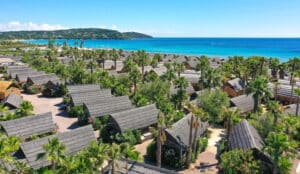Kick off your shoes at these campsites along the coast of France, staying in a tent on the dunes, a posh tipi or a cool cabin right on the beach.

Le Club Farret Vias Plage, near Béziers, Languedoc
Yelloh! has campsites across France and is popular with young families thanks to its excellent facilities: numerous pools, restaurants, kids’ clubs, a wellness spa for grown-ups, which can be booked direct or through operators such as Eurocamp and Thomson Al Fresco.
Le Club Farret Vias Plage is on its own exclusive-use beach and with unfancy but functional units clustered in themed areas (pirate has pool, a waterfall and rope bridges; Pacific has a tiki vibe with straw roofs on the cabins).
The best are in the Beach area, right on the sand but with gated gardens, so parents can relax. The site is a 15-minute taxi ride from the tiny Béziers airport (served by Ryanair from Bristol and London), so is handy for those who don’t want to hire a car.
www.yellohvillage.fr. Open 10 April-27 September, camping from €18 a night, units from €39 a night.
Kon Tiki Riviera Village, Côte d’Azur (pictured)
On an expensive stretch of coast, Kon Tiki is one of three resorts run by the Riviera Villages company. Its thatched cabins (which sleep two to six and range from basic to fully equipped) are on Pampelonne beach, where bling-lovers pay over the odds to access the area’s private beach clubs.
Huts are linked by sandy paths and shaded by palm trees but you’re not here to chill out: five restaurants have a party vibe, there are lots of water-sports and kids activities, and the site has a circus.
There are no tent pitches, but this is St Tropez, so it’s the closest you’ll to get to roughing it with the jet set.
www.en.riviera-villages.com. Open 11 April- 10 October. Huts from €60 a night.
Domaine Les Moulins, Ile de Noirmoutier, Vendée
When you cross the cobbled causeway to the Ile de Noirmoutier off the west coast of France, you could be forgiven for thinking you’ve arrived in the Mediterranean of the 1960s. You’ll see people digging for clams, cyclists rolling through villages of whitewashed cottages and rows of salt pans for the harvesting of fleur de sel (fine sea salt).
In the village of La Guérinière, behind the dunes, is Domaine Les Moulins: a campsite with a difference. Instead of the static caravans that have been a fixture of French campsites since the 1970s, you’ll see wood-trappers’ tents, cabins and double-storey tipis. It’s all very tasteful, as you would expect from an enterprise run by the former CEO of Cartier.
There’s a pool, a spa, a restaurant and a kids’ club, plus a pétanque park, table tennis and crazy golf. Inside, the cabins are rustic chic, with plump duvets and rain showers, and fully-fitted kitchens where you can cook the mussels you buy from the seafood shacks and the samphire you collect from the beach.
None of this comes cheap, but there are a few more affordable pitches for traditional camping. The best thing is that you feel so close to nature, where a stroll down a track by the side of a windmill will bring you to the beach.
www.domaine-les-moulins.com. Pitches on a five-hectare site with tipis, cabins, lodges from €59 a night for canvas and wooden tents and €22 a night for DIY pitches.
Village Camping Les Pêcheurs, Roquebrune sur Argens, Provence
This classy campsite is 100 metres from a river and a lake but close enough to the coast to bike there along a family-friendly cycle path.
There are lots of activities on site and a water-sports centre at the lake. The campsite arranges events such as wine tastings; and, as well as two kids’ pools, there is an adults-only spa.
The best accommodation is the fishermen’s cabins, 20 wooden huts on stilts on lovely landscaped pitches.
www.camping-les-pecheurs.com. Open 5 April- 30 September, camping from €18.20 a night for two, cabins from €51 a night for five.
Camping Le Pin Sec, Naujac-sur-Mer, near Bordeaux
Amid pine forests and dunes just 50 metres from the sea, is a pop-up camp where surfers can stay in tipis with beds, carpets and electricity.
An onsite chef cooks your meals, and there are nightly campfires and beach parties.
It’s suitable for all, including beginners, and a daily surf lesson is included in the price. The site is 25 minutes from LacanauOcéan, a surfer hangout with bars, restaurants and clubs.
www.feralsurftours.com. Open June-September, three nights from £210pp, including accommodation, two surf lessons, equipment and all meals.
Camping Le Rompval, Mers-les-Bains, near Dieppe
You can bring your standard two-man tent to this campsite in wooded parkland on the chalk cliffs of the Baie de Somme, but for a treat book an eco-pod.
These grass-roofed structures look like brightly painted hobbit houses and are perfect for couples.
The beach, less than two miles away, is small and shingly at high tide but the sea recedes to reveal a sandy stretch.
www.campinglerompval.com. Open 4 April-6 October, camping from €21.50 a night for two, pods from €51 for two.
L’Anse du Brick, Maupertus-sur-Mer, Normandy
This terraced site has panoramic views of the sea and leads to a sandy beach. On the inland side is a 300-hectare protected area of woodland, river and waterfalls. The site has indoor and outdoor pools and waterslide, a sea-view restaurant serving regional dishes and a snack bar. The ferry port of Cherbourg is just over six miles away to the west, making it easy to get to for a weekend break.
www.anse-du-brick.com.Open 1 April-30 September, camping from €23 a night for two, cottages from €186 for a weekend for six.
Panorama du Pyla, Bassin d’Arcachon, Aquitaine
The Bassin d’Arcachon in south-west France has 47 miles of beaches. This camping village is right next to one of them: a 100- metre path leads from the campsite to a sandy beach and sheltered, calm sea. It is a spectacular spot in a pine forest at the foot of the Dune du Pyla, the tallest sand dune in Europe. The restaurant terrace is in a prime position under the trees, overlooking the water.
www.camping-panorama.com. Open 11 April-29 September, camping from €18 a night for two, wooden bungalows from €30 a night for four.
Camping Les Baleines, Île de Ré, near La Rochelle
Get back to nature at this campsite at the westernmost tip of the Île de Ré, reached by a bridge from the mainland. The site is on the edge of the island, by the lighthouse, and opens directly on to La Conche beach and a wild stretch of coast. The remote setting is great for simple pleasures such as beachcombing, walking and birdwatching. Stay in one of the two-bedroom safari lodges for added pioneer spirit.
www.camping-lesbaleines.com. Open 19 April- 20 September, camping from €16 a night for two, lodges for four from €300 a week.
Bot Conan Lodge, Beg Meil, Brittany
This gorgeous mini glampsite is a collection of six safari lodges and three atoll tents in a secluded cove next to a white sandy beach. Each tent and lodge has its own wooden deck, outdoor kitchen and dining table, and there are two bath houses with power showers. Bikes and canoes are free to campers, and the clifftop walks start right on your doorstep.
www.botconan.com. Open May-October, tents from €59 a night for four, lodges from €97 a night for five.
Want to take your dog?
To bring your dog to France, they must be over 12 weeks/three months old (the age at which dogs may be vaccinated for rabies), be microchipped, and have been vaccinated for rabies at least 21 days prior to travel.
The Channel Tunnel is an easy way to travel between the U.K. and France. The Eurotunnel shuttle runs between Folkestone and Calais 24/7, 365 days a year and takes around 35 minutes.
What documents do you need to take your dog on the Eurotunnel?
You will need to bring the following documents with you:
- Booking confirmation;
- A microchip
- A Pet Passport or Animal Health Certificate; and Proof of rabies vaccination
- Proof of tapeworm treatment administered 1-5 days before travel (Calais to Folkestone)
How much does it cost to take your dog on the Eurotunnel?
To book your dog on the Eurotunnel, it will cost £22 each way. However, there are additional costs that you should take into consideration.
These include the cost to obtain a pet passport or animal health certificate, microchip, rabies vaccination, tapeworm treatment, a dog travel carrier and supplies such as food and puppy training pads to soak up any accidents.
(Article source: The Guardian)

